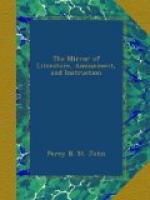Breathe not those names to-day!
They shall have their praise
ere long,
And a power all hearts to sway
In ever-burning song.
But now shed flowers, pour wine,
To hail the conquerors home!
Bring wreaths for every shrine—
Lo! they come, they come!
The original engraving is by Edward Goodall, from a painting by William Linton, Esq. It is altogether a rich and glorious composition, at this moment too, glowing with more than pictorial interest; and the carmen triumphale of the poetess is a worthy accompaniment. Among the other engravings the frontispiece and opposite page of this work are extremely rich and beautiful: Psyche borne by the Zephyrs to the Island of Pleasure, is full of languishing beauty; Medora, painted by Pickersgill and engraved by Rolls, is a delightfully placid moonlight scene; the Declaration, easy and graceful: there are, however, in our opinion, two decided failures in the volume, which, for the credit of the artists, had better been omitted. Our present notices of the literary department must be confined to the following selection:
THE CITY OF THE DEMONS.
By William Maginn, Esq.
In days of yore, there lived in the flourishing city of Cairo, a Hebrew Rabbi, by name Jochorian, who was the most learned of his nation. His fame went over the East, and the most distant people sent their young men to imbibe wisdom from his lips. He was deeply skilled in the traditions of the fathers, and his word on a disputed point was decisive. He was pious, just, temperate, and strict; but he had one vice—a love of gold had seized upon his heart, and he opened not his hand to the poor. Yet he was wealthy above most, his wisdom being to him the source of riches. The Hebrews of the city were grieved at this blemish on the wisest of their people; but though the elders of the tribes continued to reverence him for his fame, the women and children of Cairo called him by no other name than that of Rabbi Jochonan the miser.
None knew, so well as he, the ceremonies necessary for initiation into the religion of Moses; and, consequently, the exercise of those solemn offices was to him another source of gain. One day, as he walked in the fields about Cairo, conversing with a youth on the interpretation of the law, it so happened, that the angel of death smote the young man suddenly, and he fell dead before the feet of the Rabbi, even while he was yet speaking. When the Rabbi found that the youth was dead, he rent his garments, and glorified the Lord. But his heart was touched, and the thoughts of death troubled him in the visions of the night. He felt uneasy when he reflected on his hardness to the poor, and he said, “Blessed be the name of the Lord! The first good thing that I am asked to do in that holy name, will I perform.”—But he sighed, for he feared that some one might ask of him a portion of his gold.




